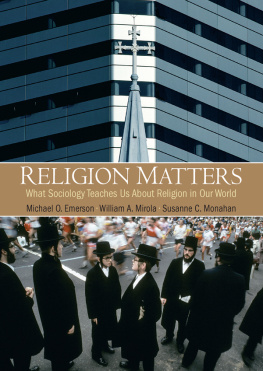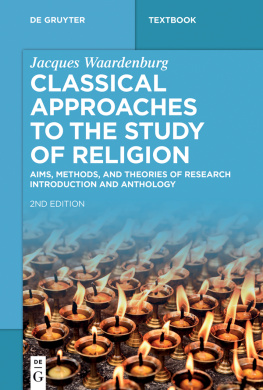The International Library of Sociology
THE SOCIOLOGY OF RELIGION
The International Library of Sociology
THE SOCIOLOGY OF RELIGION
In 8 Volumes
| I | The Economic Order and Religion | Knight and Merriam |
| (The above title is not available through Routledge in North America) |
| II | Islam and the Integration of Society | Watt |
| III | Religious Behaviour | Argyle |
| IV | The Sociology of Religion (Part 1): Established Religion | Stark |
| V | The Sociology of Religion (Part 2): Sectarian Religion | Stark |
| VI | The Sociology of Religion (Part 3): The Universal Church | Stark |
| VII | The Sociology of Religion (Part 4): Types of Religious Man | Stark |
| VIII | The Sociology of Religion (Part 5): Types of Religious |
| Culture | Stark |
THE SOCIOLOGY OF RELIGION
A Study of Christendom
Part Two
Sectarian Religion
by
WERNER STARK
First published in 1967
by Routledge
Reprinted 1998, 1999, 2000, 2001
by Routledge
2 Park Square, Milton Park, Abingdon, Oxon, OX14 4RN
Transferred to Digital Printing 2007
Routledge is an imprint of the Taylor & Francis Group
1967 Routledge
All rights reserved. No part of this book may be reprinted or reproduced or utilized in any form or by any electronic, mechanical, or other means, now known or hereafter invented, including photocopying and recording, or in any information storage or retrieval system, without permission in writing from the publishers.
The publishers have made every effort to contact authors/copyright holders of the works reprinted in The International Library of Sociology. This has not been possible in every case, however, and we would welcome correspondence from those individuals/companies we have been unable to trace.
British Library Cataloguing in Publication Data
A CIP catalogue record for this book
is available from the British Library
Sociology of Religion: Part Two - Sectarian Religion
ISBN 0-415-17590-9
The Sociology of Religion: 8 Volumes
ISBN 0-415-17823-1
The International Library of Sociology: 274 Volumes
ISBN 0-415-17838-X
Publishers Note
The publisher has gone to great lengths to ensure the quality of this reprint but points out that some imperfections in the original may be apparent
CONTENTS
3. THE DECAY OF SECTS
The present publication needs no long introduction. All I have to emphasize is that it forms a whole with the volume which preceded it under the subtitle Established Religion, and with the volume which will succeed it under the subtitle The Universal Church. The three books together represent a comprehensive study of the relationships, within the orbit of Christendom, between religious organizations on the one hand and the inclusive society on the other.
W. STARK
Acknowledgments
As in volume I, we list here, with thanks, the publishers who have been good enough to permit us to quote from books under their imprint. The authors names are given in brackets.
Abingdon Press (Cameron, R. M.); The Bodley Head (Avvakum); Cambridge University Press (Braithwaite, W. C); The Carey Kingsgate Press (Underwood, A. C.); Columbia University Press (Curtiss, J. S.; Shaw, P. E.); The Cresset Press (Huehns, G.); John Day Company (Whalen, W. J.); Doubleday & Co. (Harris, S.; Herberg, W.); Gerald Duckworth & Co. (Sumner, B. H.); The Epworth Press (Wilkinson, J. T.); Harper & Row (Montross, L.); Harvard University Press (Conybeare, F. C); B. Herder Book Company (Algermissen, K.); Holt, Rinehart & Winston (Turner, F. J.; Wright, J. F. C); Little, Brown & Co. (Whitney, J. P.); Longmans, Green & Co. (Lloyd, A.); Meridian Books (Niebuhr, R.); Thomas Nelson & Sons (Sandall, R.); Oxford University Press (Bridenbaugh, C; Knox, R.); Philosophical Library (Church, L. F.); Princeton University Press (Melcher, M. F.); Putnams & Coward-McCann (Hinshaw, D.); Charles Scribners Sons (Dakin, E. F.); Martin Secker & Warburg (Cohn, N.); Turnstile Press (Holloway, M.); University of California Press (Wilson, B. R.); University of Pennsylvania Press (Milyukov, P.). Also Collins-Knowlton-Wing, Inc. (Whiting, J.P.); Paul R. Reynolds, Inc. (Whalen, W.J.)
The law of life which ordains that every enjoyment shall have its price and every possession its proper burden, applies as much to the field which we are studying in this work as it does to all others. Whenever and wherever a religion sheds its lustre over the society within which it is established, that society is sure to cast back its shadow over the religion with which it is connected and by which it is glorified. The assertion that the existing institutions are God-given and God-willed has its appeal to those who are at peace with the world in which they live; but to those who are not, it will appear unacceptable, nay, repulsive and outrageous an impious mockery of all that is sacred. To those who are content already, the merging of church and state, and the ideas and ideologies which this merger calls forth, will give an even deeper contentment; but in those who, for whatever reason or reasons, feel rebellious, the sanctification of things secular will evoke an even stronger rebelliousness. Indeed, in cultures whose general thought-patterns are attuned to an underlying metaphysic, who tend to see everything in religious terms, the concepts of religion will not unnaturally be the prime medium in which social tensions become conscious and formulated and harden into fighting fronts. It could not be otherwise. Established religions are, as we have seen, embodiments of the principle of conservatism; but if this is so, then the revolutionary forces in a society must form their own religious organizations, parallel but antagonistic embodiments of the principle of revolt. These organizations, born of a negative attitude to the contemporary established socio-economic and political system, are traditionally called sects. A church, Benton Johnson has recently written, is a religious group that accepts the social environment in which it exists. A sect is a religious group that rejects the social environment in which it exists. has taught us to see the sect as a religious conflict society which has arisen in opposition to an institutional church.
We shall have to investigate later whether Johnsons unqualified use of the word church is justified in this context, and whether Niebuhrs qualification institutional is adequate. There are churches even institutional ones which do not appear to give rise to widespread sectarianism. For the moment, our main attention must be directed to the fact that sects are conflict societies. When Professor Asher studied the Molokane, he found that they called the state church Russian and its adherents Russians, as if they themselves were foreigners. This is highly characteristic. Typical sectarians are






